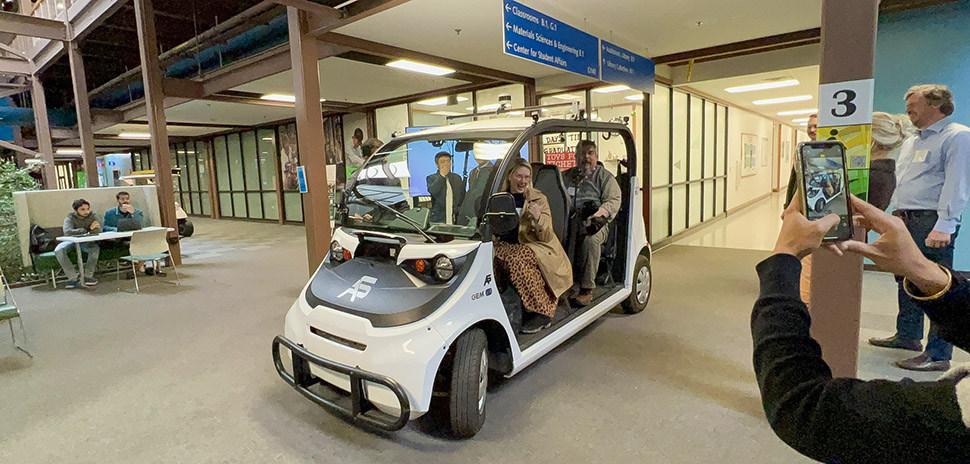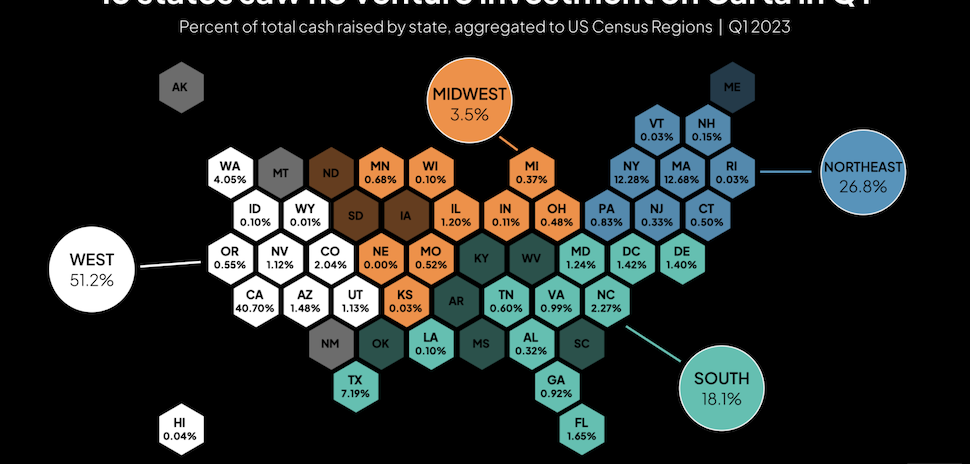The inaugural members of the Texas Semiconductor Innovation Consortium Executive Committee have been named by Gov. Greg Abbott at an announcement event at the University of Texas at Dallas.
TSIC EC will govern the work of the consortium and work with industry stakeholders to ensure Texas’ place as a national leader in advanced semiconductor research, design, and manufacturing, the governor’s office said.
“Texas is the birthplace of the integrated circuit, and we now lead the nation as the No. 1 state for semiconductor manufacturing,” Abbott said in a statement. “In the last legislative session, I signed the Texas CHIPS Act into law to help further cement Texas’ position as a national leader in the semiconductor industry. With these new appointments to the Texas Semiconductor Innovation Consortium Executive Committee, we will leverage the expertise of industry leaders and our world-class higher education institutions to ensure we not only remain the best state in America for semiconductors but we become a global leader for semiconductor innovation.”
“Thanks to the Texas CHIPS Act and the Texas Semiconductor Innovation Consortium and the Executive Committee, our great state will continue to dominate in the semiconductor industry for years to come,” Abbott added.
Abbott was joined at the announcement by House Speaker Dade Phelan, Reps. Greg Bonnen, Angie Chen Button, and Mihaela Plesa; University of Texas System Chancellor James Milliken, Texas A&M System Chancellor John Sharp, President Emeritus of UT Dallas and Executive Committee Chair Dr. David Daniel Jr., UT Dallas President Richard Benson, and other semiconductor leaders.
Members of the Texas Semiconductor Innovation Consortium Executive Committee were announced at an event at UT Dallas. [Photo: Texas Governor’s Office]
Another sign of North Texas’ place in a growing semiconductor boom
The announcement at UT Dallas is yet another sign of North Texas’ prominence as part of a growing semiconductor boom in the state. In October, Dallas snagged its second federal innovation hub in two months when the Texoma Semiconductor Tech Hub landed in the city. SMU will lead that Dallas-based hub, which is part of 31 tech hubs nationwide designated on Monday by the Biden-Harris administration.
Elsewhere in North Texas, Dallas-based Texas Instruments is building up to four new 300-millimeter semiconductor wafer fabrication plants, or fabs, in Sherman. That same city will also be the home of a new $5 billion silicon wafer manufacturing facility being built by local firm GlobiTech, a subsidiary of Taiwan-based GlobalWafers.
Keeping Texas ‘at the forefront’
“Texas has emerged as the nation’s leader in semiconductor manufacturing, and the Texas Semiconductor Innovation Consortium’s executive committee will guide further statewide growth of this vital industry in the years to come,” Phelan said in a statement. “Semiconductors are increasingly ubiquitous in our everyday lives, and it’s important we work to ensure Texas remains at the forefront of advanced semiconductor research and design. Our state has always been America’s trailblazer, and the work done by this committee will help keep Texas a leader in innovation.”
Abbott, in conjunction with Lt. Gov. Dan Patrick and Phelan, appointed seven members to the TSIC executive committee.
Abbott appointed Dr. David Daniel Jr., Sameer Pendharkar, and Lawrence “Larry” Smith to the executive committee for terms set to expire “at the pleasure of the governor.” The executive committee also selected Daniel to serve as chair. Patrick appointed Jeff Smith and Guy Schweppe and the Phelan appointed Eric Almgren and David Lee to the executive committee for terms set to expire at the pleasure of the appointing officer.
“The Texas economy is the envy of America and the world, and our blossoming semiconductor industry is further proof that Texas is the best place to do business,” Patrick said in a statement. “Our continued leadership in the semiconductor industry will bring major investment and high-quality jobs into our state and is instrumental for a brighter Texas future. I have full confidence that my appointees will provide valuable expertise to the Texas Semiconductor Innovation Consortium to capitalize on our industry leadership and drive further growth in Texas for decades to come.”
Last year, Abbott signed the Texas CHIPS Act into law to leverage Texas’ investments in the semiconductor industry, encourage semiconductor-related companies to expand in the state, further develop the expertise and capacity at Texas higher education institutions, and maintain the state’s position as the nation’s leader in semiconductor manufacturing.
TSIC ED appointees
Here’s more about the appointees, per the governor’s office:
- Daniel, of Dallas, is president emeritus of UT Dallas, a part-time engineering consultant and serves on several nonprofit boards. He is past president, executive committee member, and board member of the Texas Academy of Medicine, Engineering, Science, and Technology, member and past governing board member of the National Academy of Engineering, and a distinguished member of the American Society of Civil Engineers. Additionally, he is a former member and committee chair for the American Society for Testing and Materials and former board of trustees member for the University Research Association. He serves as a member of the advisory board for MassChallenge Texas, chair of the advisory board for the Gulf Research Program for the National Academy of Sciences, committee chair for the Hill Impact Prize Selection Committee, member of the board of directors for the National Security Innovation Council, and advisory board member for the Zyvex Corporation.
- Pendharkar, of Allen, is senior fellow and vice president of technology development at Texas Instruments. He is a member of the executive board of directors for the Semiconductor Research Corp. and currently serves as the board’s chair.
- Lawrence “Larry” Smith, of Austin, is chair of the board for Tokyo Electron U.S. He is a former chair and member of the SEMI North American Advisory Board. He also serves as chair of the board for Mobile Loaves and Fishes and previously served as chair of the board for Austin Habitat for Humanity.
- Schweppe, of Austin, is the senior vice president of Technology and Software Procurement at Dell Technologies. He previously served as a senior manager at Accenture. He is a member of the Texas A&M Supply Chain Consortium and the Texas A&M University MBA Employment Impact Board.
- Jeffrey M. Smith, of Cedar Park, is vice president of Infra Technology at Samsung Austin Semiconductor. He currently serves as an executive committee member of the Texas Association of Manufacturers.
- Almgren is a managing director at Castle Peak Advisors, an Austin-based strategic advisory company for high technology companies. Almgren began his career designing microprocessor chips at Hewlett Packard and later joined LSI Logic, now Broadcom, where he oversaw marketing and sales of highly integrated circuits and played a pivotal role in establishing CoreWare. Almgren went on to co-found Silicon Image Inc., a pioneering company in the development, sale, and licensing of high-speed serial circuits. At Silicon Image, Almgren led the HDMI licensing business, leading Silicon Image, Inc., to become a top-five semiconductor licensing business. As CEO and chair of Keyssa Inc., Almgren led disruptive innovations in high-speed wireless chips for customers that included Samsung, Amazon, Meta, Google, Intuitive Surgical, Foxconn, and LG.
- Lee is the director of corporate strategy at Dongjin USA Inc., a wholly owned subsidiary of Dongjin Semichem Co. Ltd. (Dongjin). Headquartered in Seoul, South Korea, Dongjin is a global chemical company specializing in the production of semiconductor, display, and energy materials, as well as foaming agents, generating more than $1 billion in annual revenue. Since joining Dongjin in 2019, Lee has primarily overseen large-scale overseas investment projects, including two ongoing projects in Texas for semiconductor material production. Dongjin Semichem Texas, Inc., is expected to invest over $100 million for the construction of a photoresist thinner production facility in Killeen. Similarly, DSM Semichem LLC, a joint venture among Dongjin USA, Samsung C&T America, and Martin ELSA Investment LLC, will initially invest at least $100 million for the construction of an electronic level sulfuric acid plant in Plainview.
- Elabd is the vice chancellor for research at the Texas A&M University System. He also serves as interim vice chancellor for engineering, interim dean of Texas A&M University’s College of Engineering, and interim director of the Texas A&M Engineering Experiment Station. Elabd is also a chemical engineering professor and Axalta Coating Systems Chair II at Texas A&M University.
- Sreenivasan is the Cockrell Family Regents Endowed Chair No. 7 in Engineering at UT Austin. He has published over 130 technical articles and holds over 100 U.S. patents in scalable nanotechnologies. He is also the director of the Nanosystems Engineering Research Center, founder and chief technology officer of the Texas Institute for Electronics, and a co-founder of Molecular Imprints Inc. Additionally, he is an elected member of the National Academy of Engineering. Sreenivasan earned a Bachelor of Technology from the National Institute of Technology, Tiruchirappalli, and a Ph.D. from The Ohio State University.
Public university designees
The following individuals will serve on the Texas Semiconductor Innovation Consortium as designees of institutions of higher education:
- Diana Huffaker, Ph.D., of UT Arlington
- Roger Bonnecaze, Ph.D., of UT Austin
- Manuel Quevedo, Ph.D., of UT Dallas
- Miguel Velez-Reyes, Ph.D., of UT El Paso
- Can “John” Saygin, Ph.D., of UT RGV
- Howard Grimes, Ph.D., of UT San Antonio
- David Staak, Ph.D., of Texas A&M University
- Magesh Rajan, Ph.D., of Prairie View A&M University
- Ramanan Krishnamoorti, Ph.D., of University of Houston
- Nigel Shepherd, Ph.D., of University of North Texas
- Stephen Bayne, Ph.D., of Texas Tech
- Jonathan Hoekstra, of Texas State Technical College
- Shreek Mandayam, Ph.D., of Texas State University
- Jerry Lin, Ph.D., of Lamar University
- Wendy Elmore, Ed.D., of Lamar State College–Orange
- Ben Stafford, DrPH, of Lamar State College – Port Arthur
David Seeley contributed to this report.
![]()
Get on the list.
Dallas Innovates, every day.
Sign up to keep your eye on what’s new and next in Dallas-Fort Worth, every day.

































































